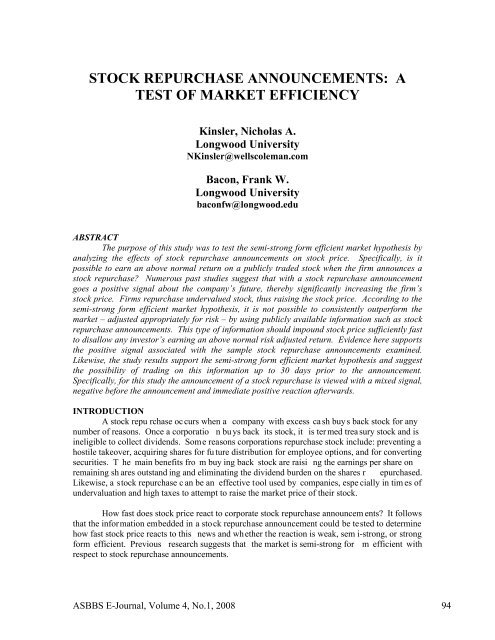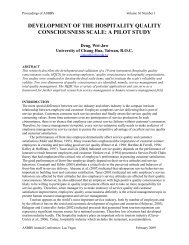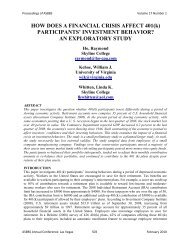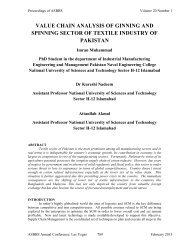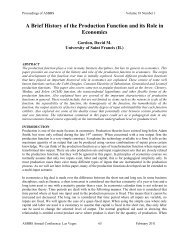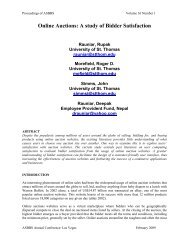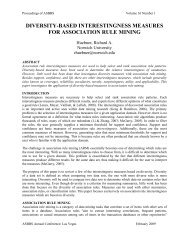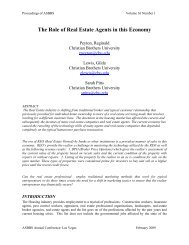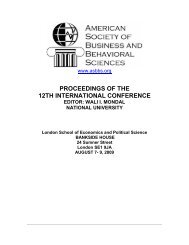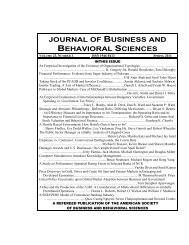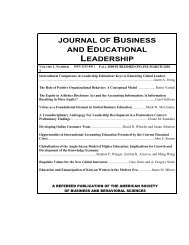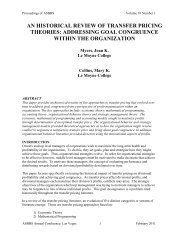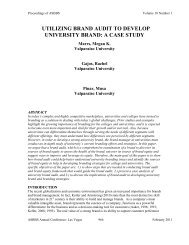stock repurchase announcements: a test of market ... - Asbbs.org
stock repurchase announcements: a test of market ... - Asbbs.org
stock repurchase announcements: a test of market ... - Asbbs.org
Create successful ePaper yourself
Turn your PDF publications into a flip-book with our unique Google optimized e-Paper software.
STOCK REPURCHASE ANNOUNCEMENTS: A<br />
TEST OF MARKET EFFICIENCY<br />
Kinsler, Nicholas A.<br />
Longwood University<br />
NKinsler@wellscoleman.com<br />
Bacon, Frank W.<br />
Longwood University<br />
baconfw@longwood.edu<br />
ABSTRACT<br />
The purpose <strong>of</strong> this study was to <strong>test</strong> the semi-strong form efficient <strong>market</strong> hypothesis by<br />
analyzing the effects <strong>of</strong> <strong>stock</strong> <strong>repurchase</strong> <strong>announcements</strong> on <strong>stock</strong> price. Specifically, is it<br />
possible to earn an above normal return on a publicly traded <strong>stock</strong> when the firm announces a<br />
<strong>stock</strong> <strong>repurchase</strong>? Numerous past studies suggest that with a <strong>stock</strong> <strong>repurchase</strong> announcement<br />
goes a positive signal about the company’s future, thereby significantly increasing the firm’s<br />
<strong>stock</strong> price. Firms <strong>repurchase</strong> undervalued <strong>stock</strong>, thus raising the <strong>stock</strong> price. According to the<br />
semi-strong form efficient <strong>market</strong> hypothesis, it is not possible to consistently outperform the<br />
<strong>market</strong> – adjusted appropriately for risk – by using publicly available information such as <strong>stock</strong><br />
<strong>repurchase</strong> <strong>announcements</strong>. This type <strong>of</strong> information should impound <strong>stock</strong> price sufficiently fast<br />
to disallow any investor’s earning an above normal risk adjusted return. Evidence here supports<br />
the positive signal associated with the sample <strong>stock</strong> <strong>repurchase</strong> <strong>announcements</strong> examined.<br />
Likewise, the study results support the semi-strong form efficient <strong>market</strong> hypothesis and suggest<br />
the possibility <strong>of</strong> trading on this information up to 30 days prior to the announcement.<br />
Specifically, for this study the announcement <strong>of</strong> a <strong>stock</strong> <strong>repurchase</strong> is viewed with a mixed signal,<br />
negative before the announcement and immediate positive reaction afterwards.<br />
INTRODUCTION<br />
A <strong>stock</strong> repu rchase oc curs when a company with excess ca sh buy s back <strong>stock</strong> for any<br />
number <strong>of</strong> reasons. Once a corporatio n bu ys back its <strong>stock</strong>, it is ter med trea sury <strong>stock</strong> and is<br />
ineligible to collect dividends. Some reasons corporations <strong>repurchase</strong> <strong>stock</strong> include: preventing a<br />
hostile takeover, acquiring shares for fu ture distribution for employee options, and for converting<br />
securities. T he main benefits fro m buy ing back <strong>stock</strong> are raisi ng the earnings per share on<br />
remaining sh ares outstand ing and eliminating the dividend burden on the shares r epurchased.<br />
Likewise, a <strong>stock</strong> <strong>repurchase</strong> c an be an effective tool used by companies, espe cially in tim es <strong>of</strong><br />
undervaluation and high taxes to attempt to raise the <strong>market</strong> price <strong>of</strong> their <strong>stock</strong>.<br />
How fast does <strong>stock</strong> price react to corporate <strong>stock</strong> <strong>repurchase</strong> announcem ents? It follows<br />
that the information embedded in a <strong>stock</strong> <strong>repurchase</strong> announcement could be <strong>test</strong>ed to determine<br />
how fast <strong>stock</strong> price reacts to this news and whether the reaction is weak, sem i-strong, or strong<br />
form efficient. Previous research suggests that the <strong>market</strong> is semi-strong for m efficient with<br />
respect to <strong>stock</strong> <strong>repurchase</strong> <strong>announcements</strong>.<br />
ASBBS E-Journal, Volume 4, No.1, 2008 94


